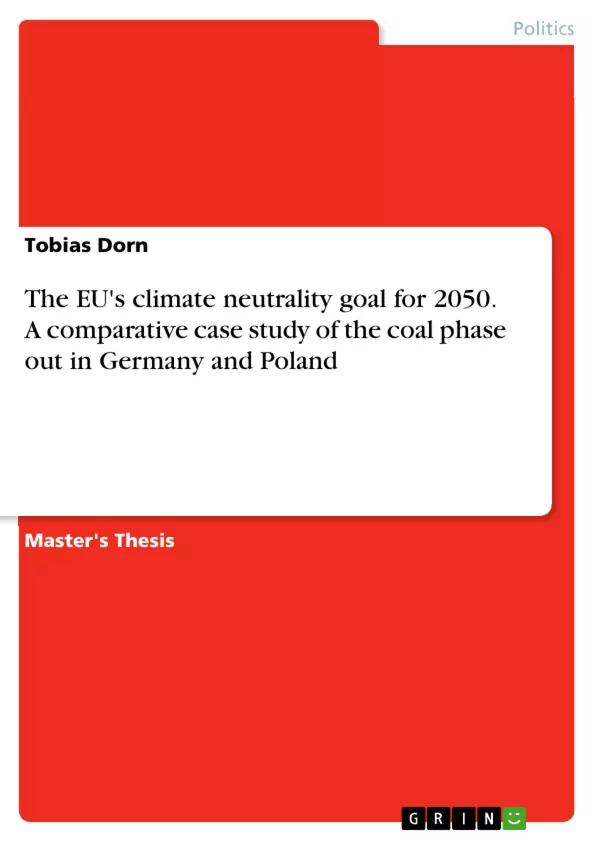For this Master’s thesis and the corresponding research question specifically, the nexus between the EU’s ambitions regarding climate change and the subsequent negotiations between its member states, serves as a starting point for the inquiry and analysis at hand. Germany’s and Poland’s coal dominated energy sectors seem to have played a major role in the outcome of the negotiations for the EU’s climate neutrality plan by 2050. That's why the analysis will focus on the debate about the coal-phase out in both Germany and Poland. The first chapter will provide an overview of the literature and the state of research regarding the coal phase-out in Germany and Poland. In the second chapter, the analytical framework will be presented in greater detail.
This presentation of the analytical framework includes the introduction and description of the societal approach’s core assumptions and variables. Moreover, a brief outline of other domestic politics theories and the literature the societal approach is based on will be incorporated. The second chapter will further include the development of hypotheses that will be tested empirically in the subsequent case study. Following this, the third chapter will outline the research method and the operationalisation of the variables to be investigated. Further, this chapter will provide an explanation of the time frame of the study and the rationale for the selection of source material. The fourth chapter will consist of the actual comparative case study. This study will be divided into the German and the Polish case respectively.
Each case’s examination will follow the same structure and will be comprised of three major sections. In the first section, an introduction to each case will provide general information about the state of affairs regarding coal energy on the domestic level and the government’s position on the matter. The following sections of each case study will be comprised of subchapters dedicated to the analysis of the societal approach’s three independent variables. The fifth and final chapter of this Master's thesis will take up and discuss the findings from the two case studies. The fifth and final chapter of this Master's thesis consists of a discussion of the research results. In this chapter, the findings from the empirical study are linked to the previously theorised assumptions.
Inhaltsverzeichnis (Table of Contents)
- Introduction
- Research question
- Epistemological interest and structure
- Review of the literature and state of research
- Literature on the energy transition in Germany
- The Polish coal sector in scientific literature
- Research gap and potential contributions
- Theoretical framework: The societal approach to governmental preference formation
- Domestic politics theories
- Defining dependent and independent variables
- Hypotheses
- Methodology and operationalisation
- Systematic process analysis
- How to carry out systematic process analysis
- Operationalisation of the variables
- Case study 1: Germany
- The German governmental position
- Societal ideas in Germany
- Material interests in Germany
- Institutions in Germany
Zielsetzung und Themenschwerpunkte (Objectives and Key Themes)
This thesis aims to explore the process of coal phase-out in Germany and Poland within the context of the EU's climate neutrality goal for 2050. It seeks to understand the factors influencing the decision-making process in these two countries, focusing on the interplay between societal actors, their interests, and national institutions.
- The EU's climate neutrality goal for 2050 and its implications for member states
- The role of societal actors in shaping energy policy, including public opinion, business interests, and labor unions
- The impact of national institutions and political structures on the implementation of climate policy
- A comparative analysis of the coal phase-out process in Germany and Poland, highlighting the differences and similarities in their approaches
- The economic and social implications of the coal phase-out, including job losses, energy costs, and regional development.
Zusammenfassung der Kapitel (Chapter Summaries)
The first chapter introduces the research question and the epistemological framework of the thesis. It outlines the focus on the societal approach to governmental preference formation and the comparative case study design. Chapter two provides a review of relevant literature on the energy transition in Germany and the Polish coal sector, highlighting existing research and identifying research gaps. Chapter three lays out the theoretical framework, outlining the societal approach and defining the key variables. The fourth chapter delves into the methodology and operationalization of the research, outlining the systematic process analysis and the methods for operationalizing the variables. The fifth chapter presents the first case study, focusing on Germany. It analyzes the German governmental position on the coal phase-out, examines societal ideas and interests, and explores the role of institutions in the decision-making process.
Schlüsselwörter (Keywords)
The key terms and concepts in this thesis include the EU's climate neutrality goal, coal phase-out, energy transition, societal actors, governmental preference formation, domestic politics, comparative analysis, Germany, Poland, systematic process analysis, and the interplay between material interests, societal ideas, and institutions.
Frequently Asked Questions
What is the EU's climate neutrality goal for 2050?
The EU aims to achieve net-zero greenhouse gas emissions by 2050, which requires a significant transformation of energy sectors across all member states.
How do Germany and Poland differ in their coal phase-out approach?
The thesis explores how domestic politics, societal ideas, and material interests lead to different strategies and timelines for phasing out coal in these two neighboring countries.
What is the "societal approach" mentioned in the study?
It is a theoretical framework that analyzes how societal actors (like unions or businesses) and national institutions shape a government's position in international negotiations.
Which factors influence energy policy according to this research?
Key factors include public opinion, material economic interests, and the specific political structures of each country.
What research method was used for the comparison?
The study employs a systematic process analysis and a comparative case study design focusing on Germany and Poland.
- Arbeit zitieren
- Tobias Dorn (Autor:in), 2021, The EU's climate neutrality goal for 2050. A comparative case study of the coal phase out in Germany and Poland, München, GRIN Verlag, https://www.grin.com/document/1188083



